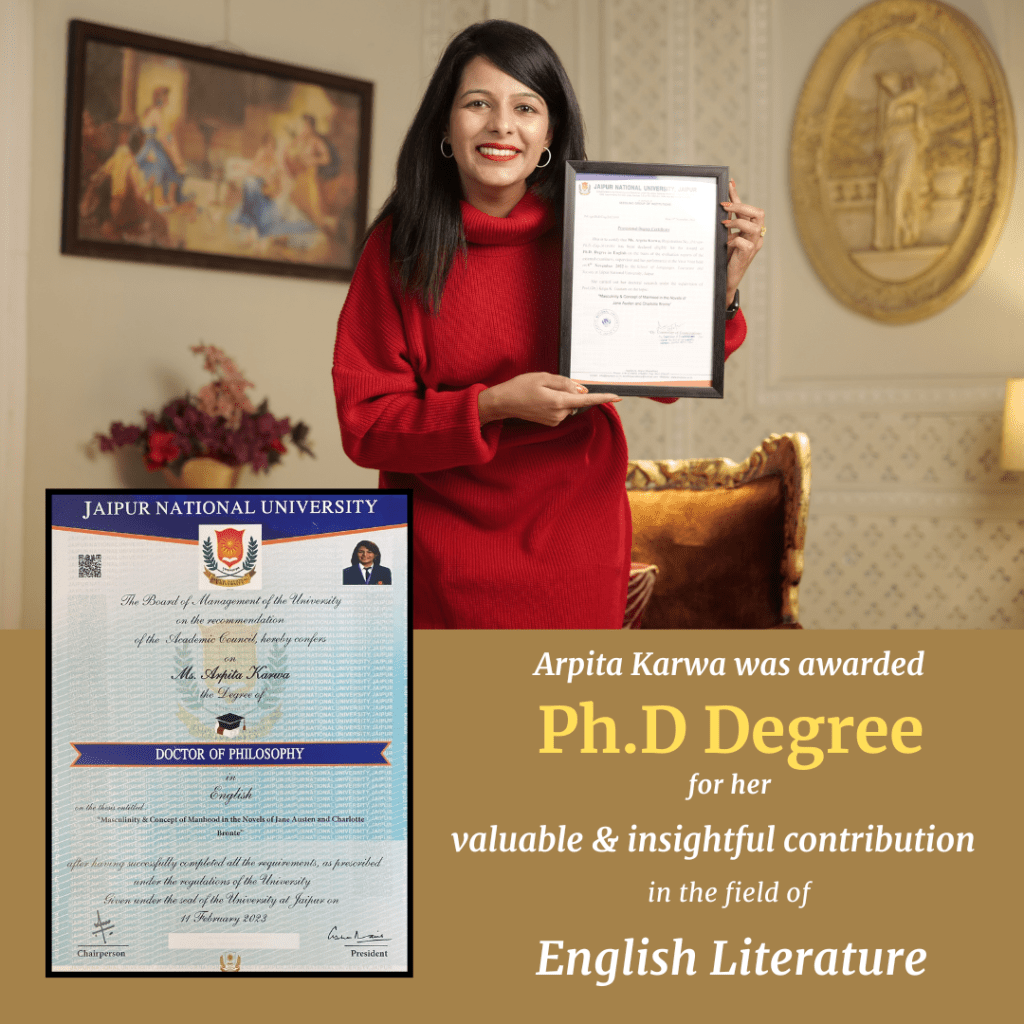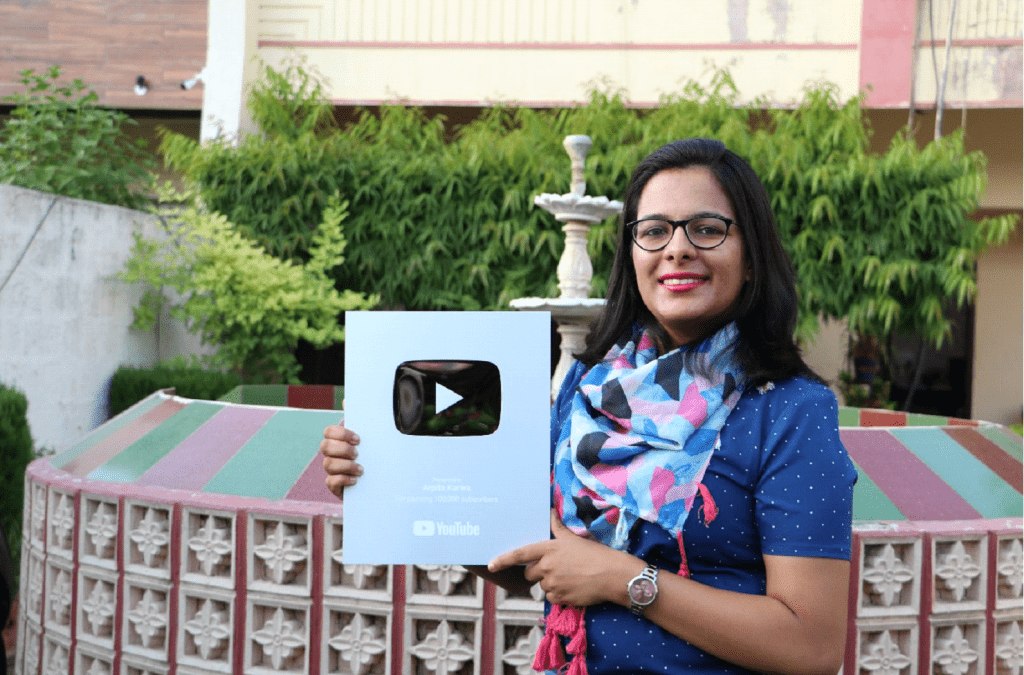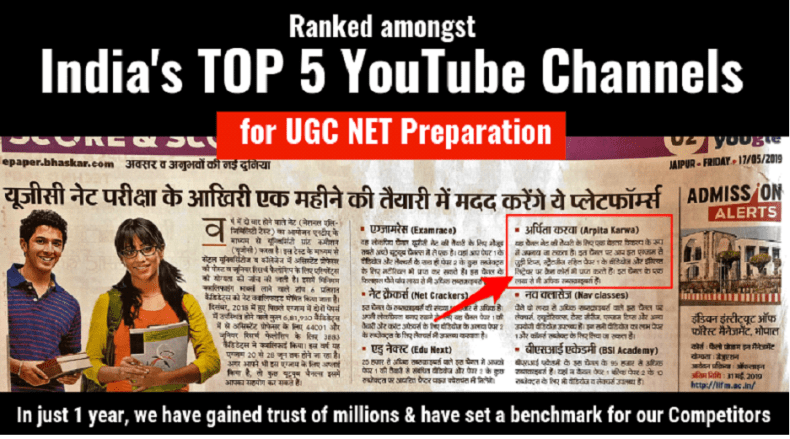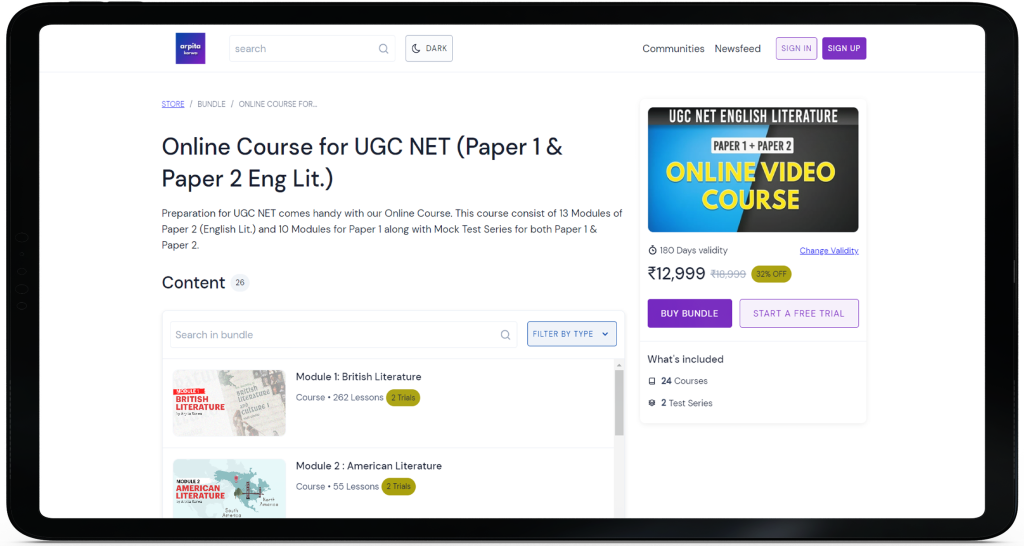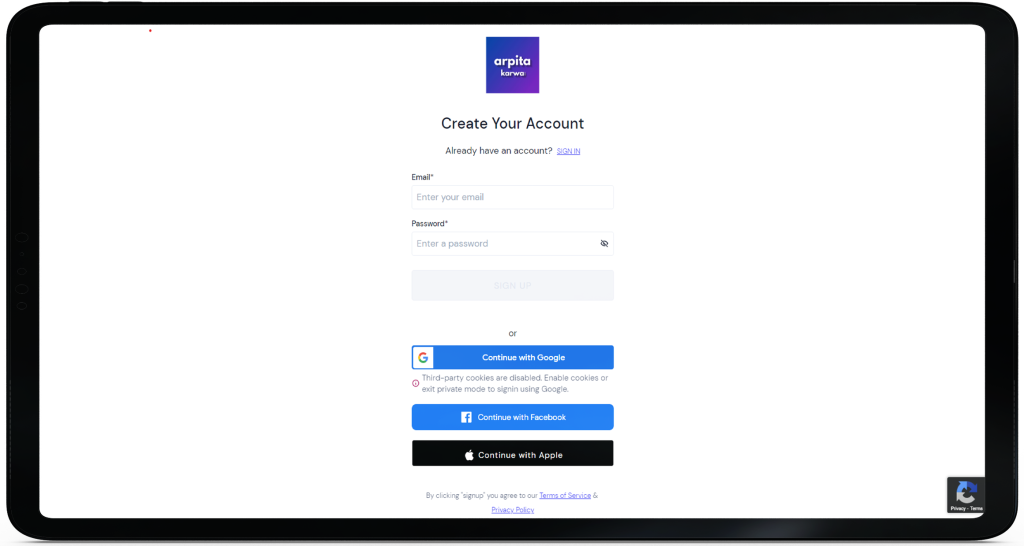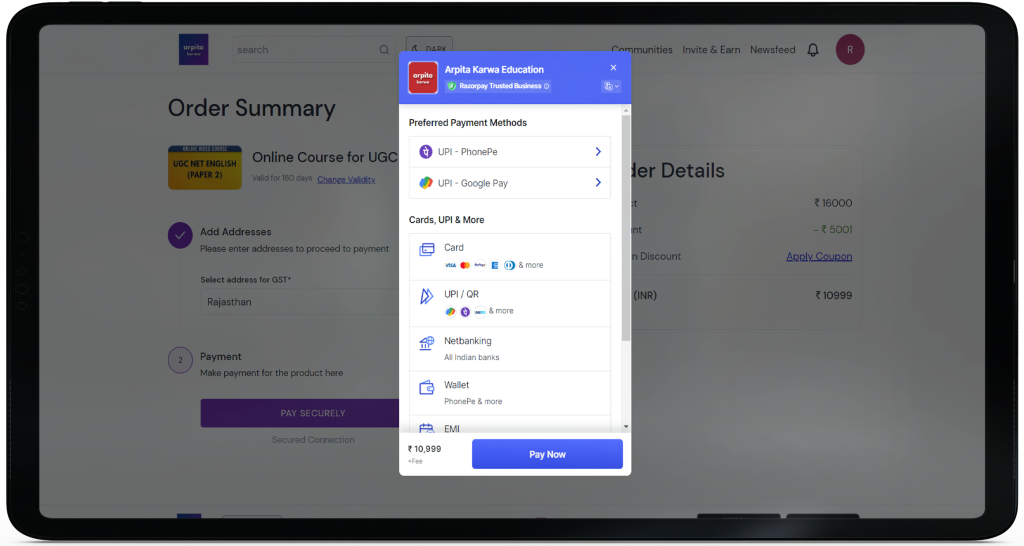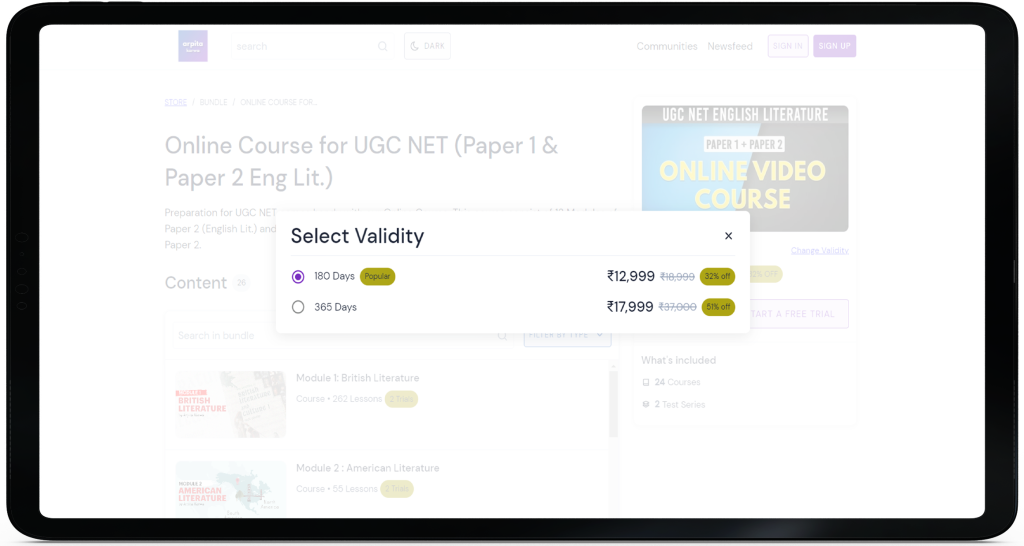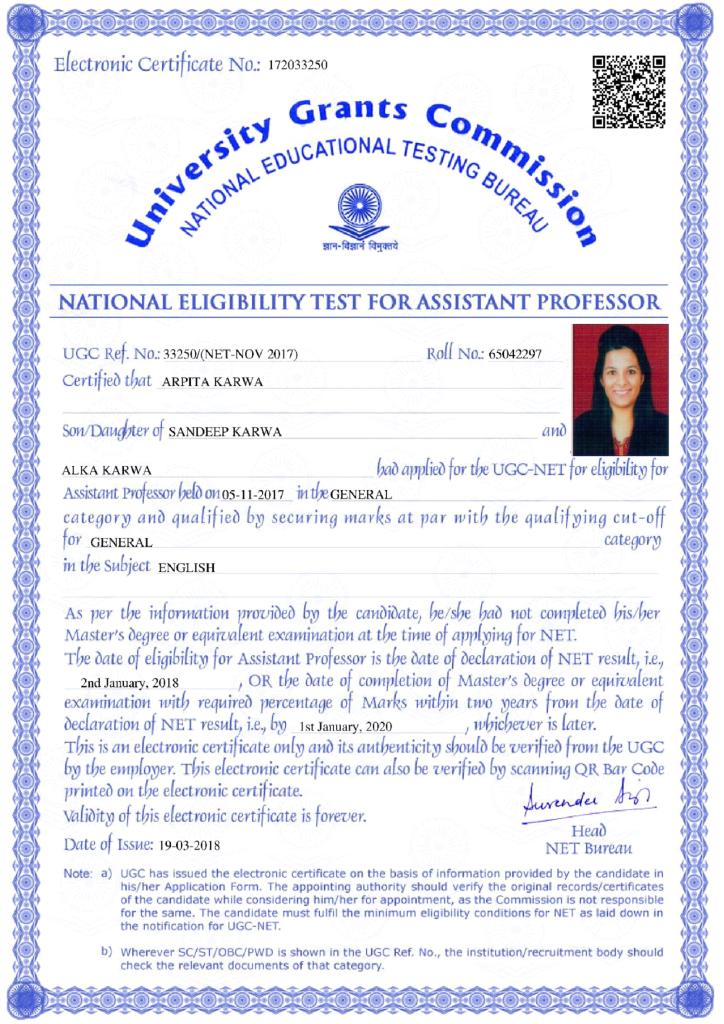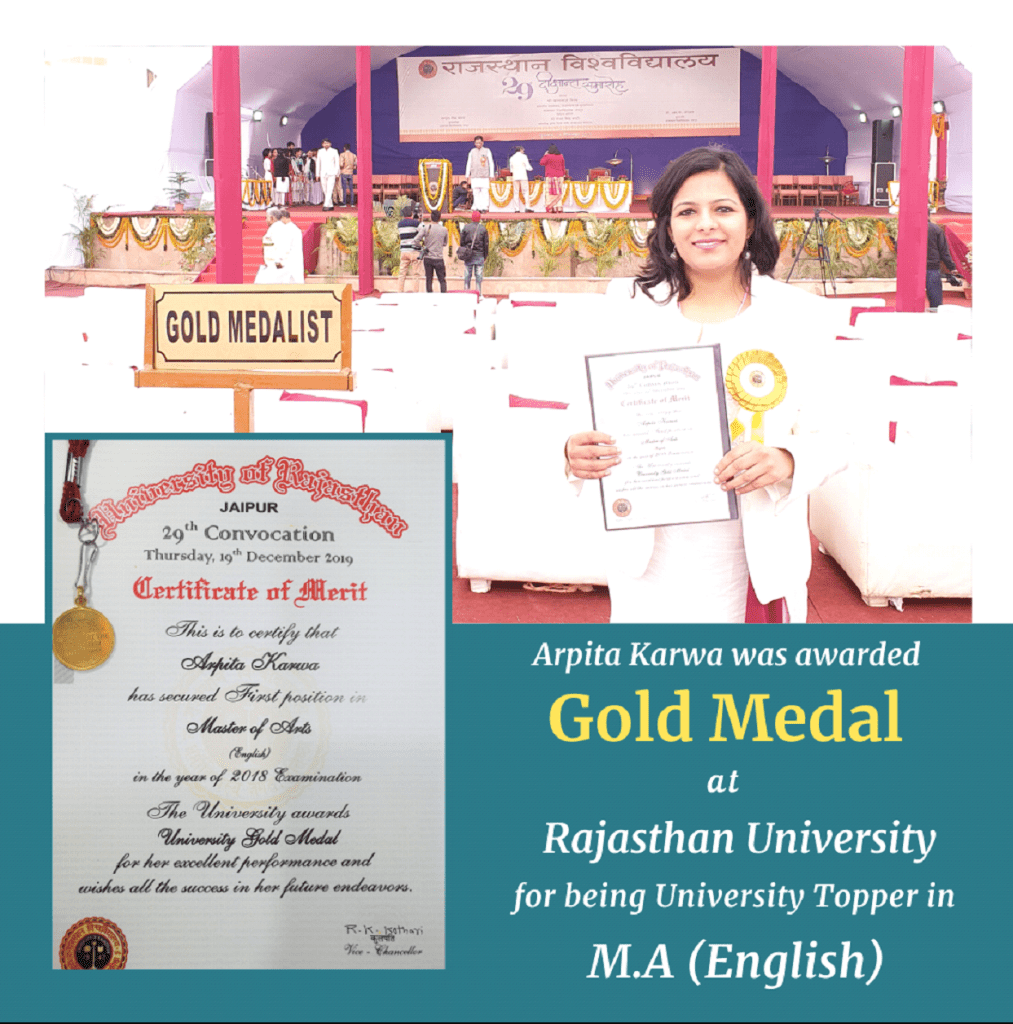UGC NET Paper 1 November 2020 (Conducted on 12th November 2020 : Morning Shift)
October 18, 2022 2025-08-18 14:17UGC NET Paper 1 November 2020 (Conducted on 12th November 2020 : Morning Shift)
November 2020: Paper 1 (Conducted on 12th Nov 2020 : Morning Shift)
Q.1) The modality of ‘teaching’ has to be differentiated from ‘training’ or ‘instructing’ in terms of which of the following learning outcomes?
[1] Disciplined and patterned behaviour
[2] Critical and creative thinking
[3] Firm and durable association of ideas
[4] Quick feedback
Correct Answer: 2
Q.2) Which of the given learner characteristics are associated with field-dependent (holistic/visual) learning style?
Ii) Focusing on facts and principles
ii) Relating concepts to personal experience
iii) Formal interaction with the teacher related to tasks at hand
iv) Preferring to compete rather than cooperate
v) Preferring to cooperate rather than compete
vi) Perceiving global aspects of concepts and materials
[1] i), ii) and iii)
[2] ii), iii), and v)
[3] ii), v) and vi)
[4] iv), v) and vi)
Correct Answer: 3
Q.3) Which of the following potential factors affecting teaching are related to instructional facilities and learning environment?
i) Praise and encouragement by teachers
ii) Non availability of textbooks/reading materials for use
iii) Proactive moves in the interactive processes
iv) Shortage of highly qualified teachers
v) Availability of smart classes
[1] i), ii) and iii)
[2] ii) iii) and v)
[3] i) iv) and v)
[4] iii) iv) and v)
Correct Answer: 2
Q.4) When the ‘test data’ tell us about a student’s level of proficiency in a defined area, the procedure of evaluation is called
[1] Formative evaluation
[2] Summative evaluation
[3] Norm-referenced testing
[4] Criterion-referenced testing
Correct Answer: 4
Q.5) Which of the following is indicative of innovations in evaluation system at present?
[1] Semesterization system
[2] Project based evaluation system
[3] Choice based credit system
[4] Objective based evaluation system
Correct Answer: 3
Q.6) Identify the qualitative research designs from the list given below:
i) Exploring common experiences of individuals to develop a theory
ii) Controlling, manipulating, observing and measuring the effect
iii) Exploring the shared culture of a group of people
iv) Exploring individual stories to describe the lives of peaple
v) Extending generalizations from sample to population
[1] i), iii) and iv)
[2] i), ii) and iii)
[3] ii), iii), and v)
[4] ii) iv) and v)
Correct Answer: 1
Q.7) Which of the following shows the correct sequence in undertaking Action Research based studies?
[1] Planning, Acting on the plan, Observing and Reflecting
[2] Acting on the plan, Observing. Planning and Reflecting
[3] Reflecting, Planning, Acting on the plan and Observing
[4] Acting on the plan. Reflecting, Planning and Observing
Correct Answer: 1
Q.8) Application of ICT in research is relevant in which of the following stages?
i) Survey of related studies
ii) Data collection in the field
iii) Data Analysis
iv) Writing the thesis
v) Indexing the references
[1] i), iv) and v)
[2] i), iii) and v)
[3] i), ii) and iv)
[4] i), iii) and iv)
Correct Answer: 2
Q.9) Match the following:
a) Hypothesis
b) Sample
c) Research Design
d) Research Tool
i) Techniques used for collection of facts and information
ii) Devices for arriving at conclusions
iii) A tentative statement indicating potential solution of the problem of study
iv) A subset drawn from a defined set
v) Conceptual framework for conducting research
[1] a)-i), b)-ii). c) -ii), d) -iv)
[2] a)-ii). b) -iii), c) – iv), d) -v)
[3] a)-i), b)-ii), c -iv, d)-iii)
[4] a)-iii), b)-iv) c) – v, d)-i)
Correct Answer: 4
Q.10) A researcher reports his/her research finding to the research audience in such a way that his/her personal views are necessarily getting supported. This would involves issues relating to
[1] Technical aberration
[2] Research Ethics
[3] Scientific rigour
[4] Personal predilection
Correct Answer: 2
Q.11) Assertion (A): Depending upon the classroom situation, some media of communication are more effective than others.
Reason (R): Selection of a medium is directly related to the nature of the message for students.
[1] Both (A) and (R) are true and (R) is the correct explanation of (A)
[2] Both (A) and (R) are true but (R) is not the correct explanation of (A)
[3] (A) is true but (R) is false
[4] (A) is false, but (R) is true
Correct Answer: 1
Q.12) Communication skills of students can be improved by-
a) Asking general questions
b) Exposure to new technology
c) Fostering critical thinking
d) Discriminant use of vocabulary
e) Limited listening
[1] abc
[2] bcd
[3] cde
[4] ade
Correct Answer: 2
Q.13) Structured classroom communication can be categorized as-
[1] Inter-personal communication
[2] Vertical communication
[3] Group communication
[4] Cross-purpose communication
Correct Answer: 3
Q.14) For effective communication inside a classroom, a teacher should embark upon-
[1] Ideological leanings
[2] Innuendos
[3] Issuing attention commands
[4] Listener analysis
Correct Answer: 4
Q.15) The concept of entropy as used in communication is related to-
[1] Virtual reality
[2] Marketplace
[3] Order
[4] Communicative language
Correct Answer: 3
Q.16) The next number in the given series is-
196, 384, 736,___
[1] 1344
[2] 1244
[3] 1434
[4] 1544
Correct Answer: 1
Q.17) Find the missing letters in the series:
BCA,YZX, EFD, ___, HIG
[1] UVW
[2] VWU
[3] WVU
[4] VUW
Correct Answer: 2
Q.18) Vinod’s mother-in-law is the mother of Amit’s mother-in-law. How is Vinod related to Amit?
[1] Vinod is brother of Amit
[2] Vinod is father of Amit
[3] Vinod is uncle of Amit
[4] Vinod is father-in-law of Amit
Correct Answer: 4
Q.19) In a certain code, FISH is written as EHRG. The code for JUNGLE will be-
[1] ITNFKD
[2] KVOHMF
[3] ITMFKD
[4] TIMFED
Correct Answer: 3
Q.20) 63% of employees in a company are female. If the number of male employees is 111, then the total number of employees is-
[1] 270
[2] 290
[3] 300
[4] 310
Correct Answer: 3
Q.21) “Everyone believes that there is a soul. Therefore, you should also believe it.” This inference commits which kind of fallacy?
[1] Ad hominem
[2] Ad populum
[3] Fallacy of Accident
[4] Fallacy of Ambiguity
Correct Answer: 2
Q.22) “God is great because He does great things”. This inference commits which kind of fallacy?
[1] Ad populum
[2] Fallacy of Composition
[3] Fallacy of Division
[4] Petitio Principii
Correct Answer: 4
Q.23) Anil’s participation in classroom is indifferent. His parents do not find him to be active either. But his performance in examinations, ranges from being good to outstanding. Therefore, he must be studying privately, in a clandestine way. This is an example of which kind of Pramana?
[1] Upamsna (Comparison)
[2] Anumana (Inference)
[3] Anupalabdhi (Non-apprehension)
[4] Arthapatti (Implication)
Correct Answer: 4
Q.24) The distinction between purvavat and sesavat is made with reference to which of the following pramanas?
[1] Anumana (Inference)
[2] Pratyaksa (Perception)
[3] Comparison (Upamana)
[4] Abhava (Absence)
Correct Answer: 1
Q.25) Which sentence cannot fit into the AEIO framework?
[1] No salt has iodine
[2] The salt on the table has iodine
[3] All salt has iodine
[4] Some salt has iodine
Correct Answer: 2
Q.26-30)
Q.26) The ratio of the number of companies having more production than demand to that of companies having more demand than production is
[1] 3:2
[2] 1:4
[3] 4:1
[4] 2:3
Correct Answer: 4
Q.27) Which company has minimum demand to production ratio?
[1] B
[2] C
[3] D
[4] E
Correct Answer: 1
Q.28) The difference between average demand and average production of computers of all companies combined together is-
[1] 950
[2] 190
[3] 180
[4] 850
Correct Answer: 2
Q.29) The demand for computers is less than the production of computers in how many companies?
[1] 4
[2] 3
[3] 1
[4] 2
Correct Answer: 4
Q.30) The demand of computers of Company D is more than that of the demand of the computers of Company B by-
[1] 1.5 times
[2] 2 times
[3] 2.5 times
[4] 3 times
Correct Answer: 2
Q.31) The term Plotter is best described as:
[1] An input device to produce good quality graphics
[2] An output device to produce drawings and graphics
[3] A fast storage device for storing good quality graphics
[4] A multipurpose device for taking inputs as well as outputs
Correct Answer: 2
Q.32) Which of the following is correct with respect to the size of the storage units?
[1] Terabyte < Petabyte < Exabyte < Zettabyte
[2] Petabyte < Exabyte < Zettabyte < Terabyte
[3] Exabyte < Zettabyte < Terabyte < Petabyte
[4] Zettabyte < Exabyte < Petabyte < Terabyte
Correct Answer: 1
Q.33) E-commerce involves buying and selling of:
[1] International goods
[2] Electronic goods
[3] Products related to computers
[4] Products and services over the Internet
Correct Answer: 4
Q.34) Assertion (A): An Intranet is a private network for sharing computing resources and information within an organization
Reason (R): Intranet is private version of the Internet
[1] Both (A) and R) are true and (R) is the correct explanation of (A)
[2] Both (A) and (R) are true but (R) is not the correct explanation of (A)
[3] (A) is true, but (R) is false
[4] (A) is false but (R) is true
Correct Answer: 2
Q.35) Which of the following devices allows a user to copy an external document and save it in electronic form onto a computer?
[1] Spammer
[2] Scanner
[3] Printer
[4] Plotter
Correct Answer: 2
Q.36) From the following list, identify the sources of solid waste:
i) Residential areas
ii) Oceans
iii) Institutional areas
iv) Agriculture
v) Dust storms
[1] i), ii) and iii)
[2] ii). iii) and iv)
[3] iii), iv) and v)
[4] i), iii) and iv)
Correct Answer: 4
Q.37) Identify the sources of soil pollution from the following list:
i) Industrial effluents
ii) Eutrophication
iii) Unscientific disposal of nuclear waste
iv) Off-shore oil drilling
v) Improper management of septic systems
[1] i) ii) and iii)
[2] i) iii) and iv)
[3] i) iii) and v)
[4] ii) iv) and v)
Correct Answer: 3
Q.38) Which of the following statements represents mangrove characteristics as a safety hedge?
[1] The mangrove trees are tall with dense canopies
[2] The mangrove trees provide both food and medicines
[3] The mangrove swamps separate the human settlement from the sea
[4] The mangrove trees protect vulnerable coastlines as they hold soil together
Correct Answer: 4
Q.39) Which of the following statements about the Volatile Organic Compounds (VOCs) are correct?
i) They cause acid rain
ii) They may cause cancer
iii) They play an important role in the formation of photochemical smog
[1] i) and ii)
[2] ii) and iii)
[3] i) and iii)
[4] i), ii), and iii)
Correct Answer: 2
Q.40) Which of the following was the central aim of the Paris Agreement?
[1] To reduce the CFCs emissions
[2] To strengthen the global response to the threat of climate change
[3] To address biological diversity issues
[4] To address the problem of ozone layer depletion
Correct Answer: 2
Q.41) The ancient Indian University famous for specialized study in ‘Hinayana’ was
[1] Nadia University
[2] Nalanda University
[3] Vallabhi University
[4] Vikramshila University
Correct Answer: 3
Q.42) Identify the non-conventional learning programmes:
i) Gerontology
ii) Psychology
iii) Ethical hacking
iv) Anthropology
v) Pet Groomers
[1] i), ii) and iii)
[2] ii), iii) and iv)
[3] iii), iv) and v)
[4] i), iii) and v)
Correct Answer: 4
Q.43) Identify key result areas of the Skill Acquisition and Knowledge Awareness for Livelihood Promotion (SANKALP) project:
i) Institutional strengthening
ii) Promotion of handicraft and carpet sector skills
iii) Quality Assurance
iv) Inclusion
v) Overseas Employment through an agency
vi) Expanding skills through Public Private Partnership (PPPs)
[1] i), ii), iil) and iv)
[2] i), iii), iv) and v)
[3] ii), iv), v) and vi)
[4] i), iii), iv) and vi)
Correct Answer: 4
Q.44) Identify reform related areas of governance listed by the NITI Aayog in the Three Year Action Agenda (2017-18 to 2019 – 20) exclusively:
i) Environmental
ii) Civil Services
iii) Electoral
iv) Corruption related
v) Information and Communication Technology
[1] i), ii) and iii)
[2] i), iii) and iv)
[3] iii), iv) and v)
[4] i), iv) and v)
Correct Answer: 2
Q.45) In the context of value education, which of the following stages will be considered a relatively advanced stage?
[1] Value collection through imitation
[2] Value assessment through inner evaluation
[3] Value clarification through exposure
[4] Value consolidation through integration
Correct Answer: 4
Q.46-50)
Read RC Passage to Answer:
Two paradoxes inform and problematize every discursive and practical employment of “human rights.” The first is substantive and directly political: it concerns the relation between “the human” and “the political”, and belongs to the domain of political ethics in general. The other is more nearly epistemological and moral: it addresses the issue of how one understands and practices the relationship between idea and actuality, or moral universality and cultural relativity. Each stems from the fact that human rights would cobble together two kinds of concepts and practical relations that are not innately friendly and treats them as one, ignoring the inherent absence of complementarity in their relationship. Thus, the discourse of human rights synthesizes and occludes paradoxical features of the origins, history and character of human rights as an idea and a practice, making it far from self-evident as a conceptual “thing” or guide to moral and political practice. Paradox has always marked the invocation of human rights. Since their discursive inception, the initial paradoxes have not been solved so much as layered by new iterations of them – namely, that initiated in the UDHR (Universal Declaration of Human Rights), which identifies governments as the promissories for enforcement of human rights. Joining the paradoxes is an overarching feature that articulates human rights as a trans-political phenomenon besides being a political phenomenon designed to uplift all human societies.
Q.46) The first important area of human rights paradox is concerned with-
[1] Problematization
[2] Discursive employment
[3] Human practice
[4] Political ethics
Correct Answer: 4
Q.47) The epistemological paradox of human rights refers to the understanding of-
[1] Human aspects of rights
[2] Moral degradation
[3] Cultural dimension of human rights
[4] Political relations
Correct Answer: 3
Q.48) What is ignored in comprehending two paradoxes of human rights?
[1] Innate friendliness of paradoxes
[2] Absence of complimentarity
[3] Relationship between idea and actuality
[4] Morality issues
Correct Answer: 2
Q.49) What is missing in the discourse of human rights?
[1] Self evidence as a concept
[2] Paradoxical features
[3] Exclusion of human rights features
[4] Synthesis of concept and practice
Correct Answer: 1
Q.50) What is added to the existing paradoxes of human rights?
[1] Iteration of UDHR
[2] Universality of human rights
[3] Invocation of human rights
[4] Political phenomenon across borders
Correct Answer: 4
















